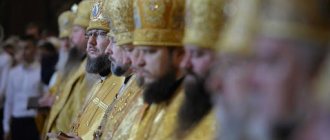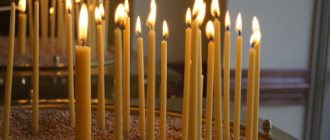Cremation
Cremation is a special topic. Nowadays, society is actively discussing this custom, unconventional for Orthodoxy, of burning (cremating) the bodies of the dead. There are also a lot of speculations and superstitions around it.
This new custom for Russia, which is becoming popular due to its relative cheapness, came to us from the pagan East. Eastern religious teachings contain the idea of reincarnation (reincarnation), according to which the soul comes to earth many times, changing its bodily shells. Therefore, paganism sees in the body not the temple of the soul, but its prison. The term of stay in another prison has ended - you need to burn it and scatter the ashes to the wind.
The Orthodox Church allows cremation only under circumstances of force majeure - lack of space in cemeteries or extreme scarcity of funds for burial. All funeral prayers, including funeral services, are performed over the cremated person without changes. Before burning the body, the icon or crucifix must be removed from the coffin, but the aureole and the sheet with the prayer of permission must be left.
There is a fear among Christians that burning will inevitably condemn the deceased to hellish torment (parallels are drawn between the fire of a crematorium and the fire of Gehenna). On this score, back in the second century, Christian apologist Minucius Felix said: “We are not afraid ... of any damage in any method of burial, but we adhere to the old and better custom of interring the body.” In the book of the monk Mitrofan “How our dead live and how we will live after death” we read: “No matter how our body is destroyed, its elements are not destroyed; and for the omnipotence of God it is possible from the existing elements to resurrect the body, whether it be burned or eaten by beasts. The elements, having heard the voice of the Creator, will gather to fulfill their purpose of forming the human body; will gather in exactly the same way as the fish heard the voice of the Son of God and immediately gathered in the net, lowered into the sea by the holy apostles at the command of Jesus Christ. This is a great mystery."
It should be noted that cremation, from the point of view of the Orthodox Church, is not an edifying action; it instills despair in the soul rather than hope for resurrection. The posthumous fate of each deceased is in the hands of God and does not depend on the method of burial.
Signs of the weather
It is not surprising that many agricultural signs, as well as predictions of spring weather, are associated with Candlemas.
- The late arrival of spring promised a starry sky and evening frost.
- The thaw spoke of early spring. It was also prophesied by a rooster who drank water that day.
- The snow that fell on Candlemas said that the spring would be long and rainy - “On Candlemas there will be snow - there will be rain in the spring.”
- The sun peeking out before sunset heralded the end of the last frosts.
- If the sun is not visible at all on this day, expect Vlasievo frosts (February 24).
- The upcoming harvest also depended on the weather. So, drops promised a harvest for wheat, but a snowstorm and blizzard meant that there would not be a good harvest. The wind spoke of the fertility of the fruit trees. On February 15, gardeners “shaked the trees with their hands so that they would bear fruit.”
- It was believed that if it snowed in the morning on Candlemas, there would be a harvest of early bread that year; snow at noon promised a harvest of middle bread, and in the evening - late bread.
Funeral service in absentia
Recently, many superstitions have developed around the rite of funeral service in absentia. This issue deserves special attention. In this regard, the following needs to be clarified. The practice of performing a funeral service “in absentia” can be justified only in cases where it is not possible to deliver the deceased to the temple of God.
Previously, the funeral service in absentia was allowed by the Church only in cases where the body of the deceased was unavailable for burial (fires, floods, wars and other emergency circumstances).
Now this phenomenon has become widespread: firstly, due to the lack of churches in many cities and villages; secondly, due to the high cost of transport and other funeral services, as a result of which the relatives of a deceased Christian decide to save on the funeral service. The latter is extremely regrettable, since it is better to refuse a wake, wreaths, or a tombstone, but to make every effort and bring the body to the temple , or, as a last resort, call the priest home or to the cemetery. Nevertheless, the Church meets people halfway and, on special occasions, performs the funeral service in absentia, somewhat shortened compared to the usual one.
An absentee funeral service must be ordered on the day of the funeral, remembering to take the death certificate to the church. It is enough for at least one of the relatives of the deceased to pray in the temple. The priest will give him a whisk, a scroll of paper with the text of a prayer of permission, and a small bag of earth. As already mentioned, the whisk should be placed on the forehead of the deceased, the prayer should be placed in the right hand, and the earth should be scattered over the body in a cross shape from the head to the feet and from the right shoulder to the left.
It happens that an absentee funeral service takes place some time after the funeral. Then the burial soil should be scattered over the grave, and the aureole and prayer should be buried into the grave mound to a shallow depth. If the grave is very far away or in an unknown place, then the aureole and prayer are burned, and the earth is scattered on any grave on which an Orthodox cross is installed.
The funeral service, like Baptism, is performed once. But if it is impossible to establish for certain whether a person was buried or not, you need, without embarrassment, to order an absentee funeral service, and the sooner the better. To believe in prejudices means to be in confrontation with the Church.
Conversations with the priest. Signs and superstitions
Peace be with you, dear visitors of the Orthodox website “Family and Faith”!
Signs and superstitions are such a terrible quagmire, from which (if a person is deeply mired in it) it is very difficult to get out.
The number 13, a leap year, a black cat, a broken mirror, spilled salt and other standard and most ordinary phenomena of our life take on a very sinful form, making frivolous people stupid and even funny...
This current topic was covered in the program of the Soyuz TV channel - “Conversations with the Father”, the guest of which was Abbot Thomas (Vasilenko), rector of the Church of St. Dimitry Donskoy at the University of the Ministry of Internal Affairs of the Russian Federation.
Leading Deacon Mikhail Kudryavtsev Transcript: Evgenia Osiptsova
– Dear friends, our topic for today is: “Signs and superstitions.” Father, do you often encounter such phenomena in your parish practice?
– Almost every day. This is both funny and sinful, as Yuri Shevchuk sings: “I can’t find words anymore, and it’s very annoying...” It happens that feelings of irritation are caused by those external little things, actions to which people pay great attention, forgetting about their inner, some... then the truths of the Gospel. It happens that highly educated people holding high positions become so close to these misconceptions that they carry them throughout their lives. Moreover, they seem to agree that this is nonsense, but they cannot refuse them. I have a couple of examples of this.
So, several years ago I talked with a person who came to me with questions about a wedding. Usually people ask about external issues: what to buy, who to invite, where to stand, what to wear, etc. He also asked about this, and at the end of the conversation he asks the question: “But now, in a leap year, you can’t get married?” And he himself smiles, realizing the absurdity of his question. I answer: “You are an educated person and you understand that all this is not serious.” He smiles again and says: “Yes, I understand, but the wife...” The wife is supposed to be an assistant for her husband, but it turns out that she steers him - and in the wrong direction.
Let me give you another example. Quite recently there was a conversation about the number 13. It’s not that it was an argument - I understood: a person firmly stands on his own and it is useless to argue with him now. But I decided that as soon as there was an opportunity, I would talk to him and find an opportunity to convince him. Or maybe he is watching this program. Although a person, in general, is at an age when it is difficult to part with his beliefs. Remember how the Monk Paul the Simple, who was already nearly 60 years old, came to Anthony the Great and he said to him: “What kind of monk will you make? Leave! You are already used to living your own way, and it will be difficult to change you.” Still, I will try to correct that person’s mistake, so I will look for an opportunity. A person in a high position, aged, educated, seriously believes that the number 13 is somehow not entirely appropriate. And why? Well, he decided so, someone said something, he heard some expressions (we won’t repeat them now), but if you use common sense, turn on your mind, it will become clear that there is no difference - 12, 13 or 666 The Bible also has these numbers, so why, as one priest said, cut out pages with these numbers? Or let there be a 14th page immediately after the 12th page? Just as in some skyscrapers the 13th floor is not populated, as well as the 26th, 39th, that is, multiples of 13...
– In Japan they don’t occupy the 4th floor; they consider it unlucky.
– In Japan, there is also fermentation on this topic in people’s heads. So there are a lot of such examples. A person puts a candle, for example, and watches what happens to it: it starts to flow - oh, there’s something wrong; and God forbid she fell - this is again some kind of bad sign. It turns out that people are looking for some signs in everything: a black cat, a bird flying the wrong way; They believe in some omens and superstitions. But these are things that humiliate a person and make normal people smile and laugh. Although, in a good way, you have to feel sorry for the person and try to convince him.
Very often people come to me with such questions that at first you can’t even find the words, you think: how could such a thing come to mind? Or they ask such hackneyed questions that the thought arises: “How many times can you ask about the same thing?” It’s as if, you know, the evil one has taken his squad and is sending me people infected with these questions in order to test and test my patience...
Or as for the dissolution of church marriages... There is a competent expression - “dissolution of church marriages,” but no! People come and say: “I need to get debunked!” Now I’ve resigned myself, maybe I’m thinking: okay, I won’t waste my time on these words, I’ll help the person in a different way. And before it was annoying.
– Father, what to do with those signs that have already become a habit: look in the mirror if you’ve returned; knock on wood so as not to jinx it, spit over your left shoulder... Many people don’t even notice that they are doing this. How to deal with this?
– Divine grace is needed in everything and everywhere. In any case, you need to turn to the Gospel, which contains answers to all questions, and if there is no direct answer there, then you can look at the interpretations of the holy fathers. Christ told us: “Without Me you can do nothing.” And all these habits, which we consider our nature, are in fact peculiar strings by which evil spirits pull us: they have become attached to us through some of our habits and control us. God's grace destroys all this, but only if a person himself notices these habits or someone tells him about them. Usually it is better to see other people's sins than your own. In such cases, you need to be grateful, patiently endure the remark and think: perhaps I need to fix this. Of course, confession is important if a person repents and corrects himself. And when he receives communion, Christ Himself comes, inhabits the person and changes him. If a person can retain Christ within himself through some effort of will, then he becomes different, transformed. Peter Mamonov once in an interview (in my opinion, on the Soyuz TV channel) talked about how grace works: “Before, when I was hammering a nail into a wall and hitting my finger with a hammer, I uttered certain unprintable expressions. After I started going to church, taking communion, took some more or less churchly steps, now I began to say this, if I hit my finger with a hammer past a nail: “Oh! I didn’t do it, it was the grace of God!” Say "oh!" It’s natural for a person, but unprintable words are not!
- A wonderful example, father! Let me ask you a question that we received through our VKontakte group: “I saw that in a church shop they sell blessed salt with the following inscription: “Salt blessed for Easter, which should be sprinkled near your home to ward off all evil spirits.” " Is this approach to consecrating one’s home Orthodox, or is it rather paganism?”
– As we remember from the Holy Scriptures, even from the shadow of the Apostle Peter, miracles were performed, and the aprons and headbands (that is, headbands) of the Apostle Paul healed the sick. Therefore, everything consecrated has some kind of grace-filled power. In our Church there is a rule: in the main things there is similarity, in the secondary things there is difference. Maybe this salt has beneficial powers, I cannot say based on my experience, but I think this way: we have traditional things - holy water, the rite of consecrating a home or the plot of land on which you live, you can resort to this, use this. And if a person wants to invent something of his own, then he needs to look at what motive drives him. If he wants to stand out, to show off (“look how original I am!”), then this is useless, it’s a sin. But when there is simply a need (I would be glad to do it differently, but there is no opportunity), then this is a different matter. There have been cases in the history of the Church when people were baptized with sand due to lack of water. So you need to look at what reason motivates a person if he acts one way or another.
– Father, how to distinguish the line between tradition and superstition? For example, we have a tradition of carrying a Friday or Thursday candle home during Holy Week and making crosses on the doorposts. Is this a superstition or a tradition?
– Personally, I did this, starting from my first serious steps in the Church, after my life turned upside down: I was thrown out of the world and I began to grow in faith. I then lived in Mordovia, in a monastery, in the same cell with a driver who was an absolutely non-church person. He was a fan of, as they say, pawning people by the collar. When there were long services in the monastery and the abbess was busy with them, he was released, and so he had days off. And so, returning after the service to my cell with a candle, I smoked a cross on the door frame, read prayers before going to bed and thought that if I went to bed now and closed the door, my neighbor would come in the night, tipsy, knock and wake me up, so I decided to leave the door open. I went to bed, I heard: he came. He had tarpaulin boots, and you could hear his heels clicking in the corridor. My name at that time was Alexander, I did not yet have holy orders and lived in a monastery as a laborer. And so my neighbor runs around the door, knocking his heels and shouting: “Alexander, open the door! Open the door, I said! Why are you closed? As you can see, a drunkard is the devil's favorite child. Naturally, when a person is in such a state, the Holy Spirit is not in him. There are only remnants of reason that God gives him so that a person does not perish completely. And this little cross does not allow him to enter - the door is open, but he cannot enter! It’s as if there is an invisible shell or an invisible spacesuit. That's why I do this every year and will continue to do so. Of course, I don’t encourage anyone to put crosses with a candle, but my personal experience has convinced me that this needs to be done. I asked the Metropolitan about this too. He also adheres to this tradition. One day I see that there is no place to put a cross - the whole joint is in them. I ask: “What should I do, sir? Where to put it? “Do it in the second circle, right on the other one,” he answered. So, this is most likely a tradition. What is tradition? The church rule says that tradition is something that has been used by people for at least thirty years. Of course, outdated beliefs can also find their way into church tradition. Here you need to have some experience, somehow check this or consult with more experienced people - those you trust.
- Thank you, father! But TV viewers ask: “What are the consequences of fortune telling?”
- Fortune telling is a mortal sin. We take everything from the Holy Tradition, and it consists of oral and written. The Bible explicitly says that Saul was punished because he consulted a fortune teller. Fortune telling was prohibited in the Old Testament, but the Old Testament rules have been preserved; they discipline people. I remember now the Christmas fortune-telling that is common among the people. Moreover, they are associated with Epiphany bathing in the font. I read an expression of one bishop about this, widespread in Rus' even before the revolution: “He who tells fortunes at Christmas is the one who bathes in Epiphany.” Swimming at Epiphany is not as scary as fortune telling; fortune telling is an absolute evil. Moreover, there may be a hidden misconception in the custom of bathing at Epiphany. In a person’s life, immersion occurs only once, and for us, when we baptize a person, what is important is not nature, not that it is a water element, but that we are baptizing into Jesus Christ. Water is taken as a convenient element, because it is convenient to lower a person there, and so, in theory, it would be necessary to immerse him in the ground three times, in honor of the three days that the Lord was buried in the ground. We take water because it is more convenient, and besides, water is used as a means of cleansing the body; John the Baptist and the disciples of Christ also used water when they baptized for repentance.
But again, you need to look at what your motive is, why you are going to the baptismal font. I have an acquaintance with whom we communicate a lot; he often asks me questions about spiritual life. I convinced him, and he stopped bathing at Epiphany. But instead I began to go to services on these days and take communion. He understood: this is where the center is, this is where the most important thing of the whole holiday is, and not just to quickly run and plunge into the font. Of course, this has power: the water is holy, the Great Hagiasma. But, you know, you can say this: people loved the light, but not much. When you take communion, you give your entire being to Christ - He comes and dwells in you, and you yourself become a temple. And this bathing, in my opinion, is only external, although it also sanctifies, but does not provide forgiveness of sins, which happens at confession.
- God bless you, father! In addition to the question about fortune telling: if a formally Orthodox person is involved in extrasensory perception, esotericism, and is, in a word, interested in these modern trends, then how should one treat him?
- Formally. There is an expression - to kill time. It is a sin. We will be responsible for everything before God. We are given time to spend on good deeds. And what kind of good deeds are there if a person is engaged in extrasensory perception, fortune telling, astrological forecasts, or reading dream books?
– Yes, I’d also like to talk about dream books...
Regarding them, we can say that this is a set of some kind of beliefs... In general, where does this belief in dreams come from? Firstly, people are different by nature: some are more receptive, some are less - you may bother him with a stake on his head, but he will still stand his ground. So it is here. Demons can mold some of them into whatever they need, but with others they can do nothing. Through dreams a person becomes more receptive, demons try to influence him through dreams, and a person begins to develop a certain formula: if you dreamed about something, it means it will be like this. The demons help him in this and do everything to lead him away from God. They help and help, they convince and convince, and the person becomes more and more firmly on the wrong path, begins to believe himself, that is, falls into delusion. What is beauty? This is when a person believed a lie and moved away from the truth. He even begins to compile books, people like him come to him, whom he begins to teach.
But how does the Church actually teach? The Holy Fathers say that there are three types of dreams: from God, from the devil and natural sleep. If you have been doing something all day, digging, for example, soil in a garden, then you continue to dig it in your sleep - this is a natural dream. And there is some kind of revelation from God. We know about this from the Gospel - for example, it was given to Joseph; You can give other examples. There are dreams from the devil, and from them all kinds of confusion begin, and everything that confuses a person brings confusion and confusion into his soul - everything is from the devil and his demons. Like this! Therefore, formally you cannot do anything at all, not even put a cross on yourself. There is such a sin - to create a cross without the fear of God, carelessly, that is, like this: by waving your hand and depicting something like that. You can’t do anything like a swan, a crayfish and a pike, remember Krylov’s fable? One this way, the second one here, the third one in the other direction, but the result is nothing. This is how we sometimes behave. If you are planning to do something, then the Holy Scripture should be the basis: what benefit will it bring to you or your neighbors, how will you then be responsible for it? Therefore, the mind should be directed in one direction with feelings, wishes, actions, words, then the cart will move from its place.
We can talk a lot today about damage and the evil eye. “They did it to my death, you know...” Yes, you didn’t do anything to yourself! You did nothing to prevent them from harming you. What should you have done? There is the will of God, which is manifested in the commandments of God. Are you doing them? No! You did it to yourself, and the demons are happy. They took you for your sin, they have something to cling to. You don’t have sin, so they walk around you like sharks, but they can’t do anything, and if you have sin, then you are their prey - there’s the evil eye and damage. It's all a bird of a feather.
– Father, regarding dreams, we received the following question from our TV viewers: “If one of the saints dreams, says something or performs some actions in a dream, can these dreams be trusted?”
– Many saints appeared to Saint Demetrius of Rostov in a dream. But who was Dimitri Rostovsky? He led an ascetic, ascetic life. Therefore, here you need to have reasoning: if a dream is from God, then it happens that you will not believe in it right away, but the dream will be repeated a second and third time, maybe even very persistent. In a word, the person who dreams of this needs to consult with someone experienced in spiritual life. And then, God is not as impatient as we are: as soon as a person does not listen, let’s influence him. The Lord will find such levers to convey to a person what He wanted to tell him, if it really is from Him.
- Thank you, father! are a lot of various superstitions associated with candles in our church environment. Someone assigns them a special role during prayer, that is, you supposedly need to pray especially when you light a candle. Someone says that it needs to be conveyed in a certain way. Someone does not allow burning a candle from below... Tell me, why is such importance attached to the church candle and where did it come from in the first place?
– A candle is a form of almsgiving. Previously, people sacrificed animals to God, burned them, but now they use candles: they still feel sorry for the animals. God doesn’t do everything perpendicular at once: once, and a person is corrected. All this is difficult. What does even the Old Testament commandment “an eye for an eye” say? About the fact that it is impossible for the person who knocked out my eye to take out two eyes - only one and no more. And so God corrected man gradually, because humanity after the Fall became bloodthirsty: animals were sacrificed, even children were sacrificed for some time. And gradually what does God do? Sets the cutoff. Blood is shed, but the child remains alive. It seems that these bloodthirsty wolves are well-fed, and the babies, these sheep, are almost intact, just a small wound.
And so gradually we came to the point where we were burning the candle. Does God need these candles? No! He needs a grateful disposition of heart, from which we want to do something good, and the Church, like a child-loving mother, gives us this: take it, burn the candles. And there is no need to start squabbles and invent something because of this: “you are giving me a candle with your left hand” or “my candle fell and melted”, etc. It happens that candles leak because somewhere there was the technology is broken: there must be a certain thickness of the wick in relation to the diameter of the candle. When this is observed, all the wax burns, and if the wick is a little thinner than necessary, then the candle will leak: the temperature of the flame will not be enough to burn all the wax. And people look at it in such a way that they almost do fortune-telling using tea leaves. In my opinion, they also tell fortunes on wax, but we have already talked about this. In general, when there is no Tsar in our heads (and Who is our Tsar? Christ!), then people invent something unknown to themselves. If there is King Christ in the head, if a person studies the Holy Scriptures, then nonsense will not appear in it about which hand to pass the candle on, how to put it.
There is also this: many choose for themselves which place in the temple to stand. I don’t know what they get, energy from space, probably... Or when the priest blesses parishioners with a name-giving folding of his hands, some people fold their hands like a football goalkeeper does, try to catch something and wash their face with it. A person who sees something like this for the first time in the Church will say: “Crazy! I will never go to them again!” And he will be right! And as a result, we, all such “Orthodox” people, trying to do the best we can, will drive away from the Church those people who came here because God brought them. They will look at us, so “abstruse”, and leave.
– Father, I would like to talk to you about horoscopes. At least in St. Petersburg, in every minibus there are screens on which horoscopes are constantly shown. Who needs them after all?
- The demons, the devil need them. They are needed by those who want to destroy a person. According to horoscopes, a person turns out to be such a simple creature - a ciliate-slipper. Six billion live on Earth now, and there is not a single person like him. Twins are different. Yes, if you take nature, you will not find, for example, two identical zebras, you will not even find two leaves from the same tree that are identical. God is so Wise and has created everything in such a variety of ways that it is impossible to artificially fit people into twelve types. This is understandable when people live a carnal, bodily life. They perform some necessary actions in order for life to continue in the body: work a little, have some fun, do something else - and that’s all. What's next? What will happen to you then, man? What will happen to you on Thursday if you die on Wednesday? Doesn't this question come to anyone's mind? It’s natural for a person to think about this: who is he anyway? Who created it, for what? When a person does not have this, then such ignorance gives rise to all sorts of patterns in everything, not only in this characteristic of people according to twelve types. Yes, some of us probably won’t go to work until they look: “So, what do I have today? Yeah, this is it!”
– Father, we have a question from a TV viewer from Moscow: “There is such an Orthodox application for the iPhone “Orthodox Prayer Book”, and among the prayers to the saints there is a prayer to the Hieromartyr Cyprian and the Martyr Justina, but it is written in parentheses that it is read only with a blessing confessor. I try to pray to them simply because they are God’s saints, but I don’t quite understand why turning to these saints should only be with the blessing of a confessor.”
– Firstly, I think we need to contact the person who published this. Apparently he had reasons for this. Maybe the reasons for this were not general, but private, so you really need to listen to this. After all, this prayer is against sorcery, so that it does not affect people, protection from sorcerers. What is the reason for this advice - to read with the blessing of the confessor? With the fact that some person, out of Christian love, suddenly wanted to pray for his friends or relatives, who, in his opinion (and perhaps in reality), are subject to the power of evil spirits, would not be left alone with them . So he wants to take on this feat in order to recapture his loved ones from the devil and demons, but who will give him this prey? Will the devil give it to him just like that? No! That’s why the confessor’s blessing comes here. After all, what does his blessing mean? This is his prayer, it means that now you and the confessor who blessed you began to fight together for these people. I think this is how this note can be explained.
On the other hand, everything must be done with blessing. If you look at our Breviary, then from the first day, when a child was born, who has not yet been baptized (he may not even have a name yet), the priest is already asked to read a prayer for this wife, who gave birth to a child, and for the house where this child was born. And this is a blessing. Therefore, everything must be done with blessing.
- God bless you, father! Our TV viewers ask questions about the wedding. There are a lot of superstitions associated with it, such as rings falling or candles that need to be hidden or extinguished during the ceremony. What is the most important thing in a wedding and what is the criterion for a strong marriage?
– The main thing in a wedding is that you need to grow up to it. Metropolitan Anthony of Sourozh had among his spiritual children married couples who had been in a secular marriage for many years, but he did not marry them and said: “You are not yet mature enough and do not understand why this is necessary.” Because most of those getting married (although this is correct, on the one hand) want to get something here for themselves: protection of marriage, children, so that children will be born, etc. This is the same as baptizing children. You ask: “Why are you baptizing a child?” And in response you hear: “So that he doesn’t get sick, so that this or that happens...” And not because he is now dedicated to God. God adopted him so that the child would be with Him both here, now, and there, in that life. No! These are the mercantile interests: so that he doesn’t get sick... And since the child doesn’t get sick, that means I’m fine, I don’t have any problems. Or, for example, so that he studies normally - so that I don’t sit with him and “drill” knowledge into him... That is, it turns out that I would be spared from all sorts of unpleasant moments: from love for this most disgusting neighbor, who only needs, so that I spend my energy, attention and time on it. Therefore, I say again, you need to grow up to this, firstly, and secondly, you need to have a specific goal in front of you. What is a person's goal? This is to be with God, because He created man for eternal life, and a joyful life. When people have this goal individually, then in a church marriage two people join together to help each other achieve this goal. They lend each other a shoulder, encourage each other, help in this achievement, and everything earthly is already secondary. Christ said in the Gospel: “Seek first the Kingdom of Heaven, and everything else will be added to you.” But we do the opposite: we are looking for something that would be given to us here, but the Kingdom of God - so, we have completely forgotten about it.
– Father, you know, in all newspapers that are placed in mailboxes, most often on the last page there are always advertisements for various healers. There is a whole category of those who heal with prayer or Communion. How do they manage to combine our ecclesiastical elements with their practice?
– It is necessary to examine each case separately. In the life of St. Luke, Archbishop of Crimea, who himself was a doctor, there was such a case. People turned to him and said: “A certain woman is a healer. Vladyka, please excommunicate her from the Church.” Like this. How? Healer - the word itself cannot be used in a church environment. But the Bishop, being a sensible man, a holy man (it is known that the Church later canonized him as a saint), decided to personally investigate this matter and not act formally. It turned out that she read the most ordinary prayers, without inventing anything; to make potions, she used pure substances - for example, fresh sour cream; I did some tricks. He looked and said: “I bless her: she does everything normally and does not commit anything bad against God or man, does not call upon evil spirits. If she uses prayers, she uses them as they are, and not in the way some people distort a prayer in order to mock it, or use some kind of recitative, reading quickly, quickly, in order to mock the sacred text. This is not the case here." Therefore, each case needs to be examined separately, and it would be nice if there was some kind of commission, but for this, the Church, unfortunately, does not have enough priests. After all, a person needs to be theologically educated, and such people are few. You can compare how many priests there were in ancient Israel, how many sacrifices they made and burned (after all, the priests were then like butchers - they slaughtered cattle). How many carcasses had to be burned, how many priests and Levite assistants they had!
And now there is no such work, but there is another work - mental. You need to have a special education so as not to get confused in these subtleties. Outwardly, it happens like this: it seems like the icon is hanging, and the candle is burning, and there is some kind of water standing, and the healer is whispering something, but something is wrong. But it also happens differently, of course. God grant that it be so. But it happens, as happened once in the history of the Church. One courtier said to his emperor: “Let's make fun of Christianity. Let’s invite an Orthodox priest here - he’s sentenced to death anyway, so he’s not going anywhere, and we can kill him at any time, let him baptize me - just for fun.” But God cannot be mocked; the Lord, wherever He wants, conquers the order of nature and creates as He wants. People thought this way, but God thought differently: who else would laugh at whom? They brought an Orthodox priest, and, as expected, he baptized this man. The courtier comes out of the water, everyone expects some kind of buffoonery from him, clowning around on this topic, and he says to the emperor: “Why do you treat Christians this way? What harm did they do to you? And he began to list their virtues. He became an apologist, a defender of Christianity. God took him and caught him! It’s the same here: it happens that these grandmothers, healers, pursue their own goals, but God can direct it where He needs it.
I remember how once upon a time there was an advertisement for jeans in Moscow. We took Leonardo da Vinci’s painting “The Last Supper” as a format. On the one hand, blasphemy, and on the other, a person far from the Church could be interested in this. I remember how I was in my youth, far from the faith: in the 90s I was baptized, in 1996 I made my first confession and received communion, and in 1997 I became a priest. And as they say in youth slang, I was very “sausage” at the time when I came to the temple. And for myself, I understand this advertising campaign this way: yes, on the one hand, this is blasphemy, but on the other hand, for a young man like me, it will seem interesting, he can say: “What kind of “Last Supper” is this? ? It almost happened like this for me. I started reading Bulgakov’s novel “The Master and Margarita”. I read it several times, and they said to me: “Are you crazy?” And I read and re-read this novel several times. It was interesting to me (according to my inner passion) not so much the gospel narrative there, but rather the tricks that Woland and his retinue played. And then I thought (again, it was God who acted, as He acts through every person, wanting to save him): in the novel, the depiction of Jesus Christ is artistic, and I wanted to know what it was really like to read about Him in the New Testament. And I transitioned from one to the other so softly and imperceptibly. That is, I did not immediately decide: “I want to read the New Testament!” No, at the beginning “The Master and Margarita” and all these devilish tricks, and next to it, it turns out, was Yeshua, although He is not depicted like that, but it helped me: I started reading the New Testament, began going to church, signed up for the church library . Then, a few years later, when I was already a priest, the thought occurred to me: shouldn’t I read “The Master and Margarita” again? I took the book and immediately put it back - I realized that it was not that the time of this book had passed. There was a period when it served as some kind of beacon in my life, but now it has turned into a burden that pulls me down.
– Father, let’s answer the question of our TV viewer from Bashkiria: “I was baptized when I was already an adult, at 24 years old. Then the priest simply sprinkled holy water on my head. It’s clear that the font is only for babies, but please tell me, maybe in this regard I should swim in the baptismal font at least once in my life?”
- No need. Baptism does not depend on the amount of holy water poured. Your baptism is valid. What you need is to study our Orthodox faith. Again, when I was baptized, everything was the same as with this woman: I came, paid money, they wet my head with water... And after some time I opened our local newspaper and saw that there was an advertisement written there: “For those “Whoever wishes to receive the Sacrament of Holy Baptism, public conversations are held.” I thought to myself: “But I haven’t taken them, let me go and listen.” And when I came to them, I sat holding my breath the whole time the psalm-reader told us about things that I had never heard anywhere: neither from friends, nor at school, nor in the army, nor in college... I greedily absorbed it all , so now, when recently the Holy Synod, with the blessing of the Patriarch, decided to return this practice before baptism and weddings, I understand how important and necessary this is, because I myself went through this at one time. And this woman needs to think not about how much water was poured on her during baptism, but needs to study her faith. This is very important because the Gospel says: “Go and make disciples of all nations, baptizing them in the name of the Father and the Son and the Holy Spirit.” In seminary, I wrote a test on the topic of baptism (I think many people wrote it), in which various historical points were raised. In ancient times, the bishop first took an examination from a person who came to baptism, and only then allowed him to proceed. In Soviet times, it was considered a heroic feat for us to be baptized, because for this we were fired from work and there were various persecutions. Now there is no such thing: if you want, be baptized, if you don’t want, don’t be baptized, nothing will happen to you for this, no one will persecute you for your beliefs. But you can learn - and you definitely need to! You need to learn your faith.
- God bless you, father! Another question: regarding burial, there are a lot of superstitions - they cover mirrors, and everything else... How seriously should you take any such moments related to burial?
– You and I all have a head not just to wear a hat, but we need to turn it on periodically for thought processes. Why is the mirror hung? Usually a person preens in front of him, but sometimes this is unnecessary: he gets too carried away. And on those days when there is a dead person at home, there is no time for preening.
- Mourning.
– Mourning, and besides, you don’t need to get carried away with your appearance. Look what will happen to her! Come and look at the coffin! You will lie there... Think about your inner world. Perhaps, of course, there are still some prejudices on this topic. Perhaps someone is afraid to see someone from the other world in the mirror? So, if God pleases this, then the curtained mirror will not help: this monster will appear and do its job, if it is God’s will, because without it no one can do anything. And all other signs can be explained. For example, what to do with those ties on the arms and legs? Put them in a coffin.
It happens that some people want to take something from a grave as a souvenir. If it was a holy man, then you can take it. That's what we do. After all, what are relics? In the Church Slavonic language, “relics” are bones, but in our understanding it is everything that has some kind of holiness: clothes, a thing, a piece from the coffin of this holy person, the earth that covered his coffin. And if a person was a sinner, then taking anything from his coffin is dangerous.
In general, in one word we can say, you need to study, study and study, but this statement does not belong to Lenin, but was said long ago in the Holy Scriptures: “Be perfect,” which means study, study and study. Learn in everything, and in your faith first of all, because when you know it, then there will be no more questions, since this is all secondary.
- God bless you, father! Maybe you can say a few more words to us as parting words?
– I would like to wish everyone what I just talked about above: you need to learn your faith in order to drive away this ignorance. After all, what is ignorance really? This means: I “don’t know,” but I need to know, I need to know! Again, we are all baptized, but have we learned what it is? May God grant us to learn to know our faith and preserve it with our hearts. If we keep it in our hearts, then everything on the outside will be different. And if I try to observe only the external, without saving anything in my heart, then nothing will work out, and everything will be like this: like leaves fall later when their time comes.
About superstitions
How to treat dreams
Conversations with the priest. Personality transformation
Believing in prejudice means being in confrontation with the Church
There are many other signs and superstitions associated with death and burial. Every settlement has its own unique burial traditions, passed on from generation to generation. Mostly, older women consider themselves knowledgeable and enlightened in these They do not understand at all, and sometimes, on the contrary, they deliberately put themselves in confrontation with the teaching of the Church and the Holy Fathers.
All witchcraft and witchcraft are unacceptable in Orthodox traditions, including burial traditions. Any such information should be approached with great caution, remembering the harm that contacts with this kind of people bring to the soul and health. We must remember that the devil is the father of lies and with his army makes every effort to mislead a person in the truth and alienate him from the Church and its true teaching. During a funeral, the only guidance that can protect you from outright witchcraft and damage can only be the blessing of a priest.
In conclusion, it must be said that every Christian who has even a modicum of courage and civic responsibility is simply obliged to help a fellow believer or a person who is almost ready to set foot on the Church path of salvation in Christ, in the correct understanding of Divine truths. We are all mortal, but this irrefutable truth is deprived of spiritual depth and turns into banality outside the teaching of the Church, which testifies that man was created by God for immortality. All superstitions and fabrications surrounding this main issue are destructive for the soul of an Orthodox Christian.
Hieromonk Dometian, priest of the house chapel “Savior Not Made by Hands”, Novosibirsk
Signs about candles in church
More often, people appear in a sacred place during periods of despair. When other remedies were tried, but the problem remained. Then they buy thick candles, thinking that this indicates the level of religiosity, and also hoping to get more attention from the saints, they go to church.
For many, the fact of lighting a church candle is the main indicator of spirituality. They approach this with all reverence. You cannot pass a candle with your left hand or rearrange the burning ones. This will cause a surge of negative emotions or accusations of witchcraft.
When a flame creates smoke or goes out, it is perceived as a bad sign. But this indicates one thing: the candle was made in violation of technology. Such “horror stories” and aggression have a negative impact on the perception of the church.
What signs do clergy believe in?
Representatives of the clergy also cannot completely get rid of prejudices. In villages, the custom of opening the Royal Doors is still alive to make it easier for a woman to give birth. This action belongs to “homeopathic” magic, along with Voodoo dolls, golems and others. There are also priests who forbid parishioners to receive communion on important holidays unless absolutely necessary.
Not the last place in this series is occupied by gerontomania - the search for wise men, soothsayers, or simply elders who want to save the whole world. And church ministers have technophobia. They insist that the products of progress - mobile phones, computers, ATMs - are demonic inventions. As a rule, these two phenomena run parallel to each other in one person.
Church “nationalism” deserves mention. Some priests prohibit reading the works of Orthodox priests with foreign names - Kern, Meyendorff, Schmemann. These teachings are considered a threat to faith.
What not to do in church
These recommendations are necessary so as not to interfere with yourself and others to communicate with God. The priests give the following instructions:
- in the morning after bathing, light a candle in front of the home icon and pray;
- choose your clothes carefully. Nothing bright or provocative. The woman covers her head with a headscarf/scarf. Men take off their hat upon entering. Appearance is a tribute to the Lord;
- You cannot come to church full. Exceptions are made for pregnant women, the sick and the elderly;
- Before the door to the church, be sure to cross yourself three times;
- During the service they behave quietly, do not look at those present or the priest. This is a time of reflection. Keep an eye on children so as not to disturb other visitors;
- when they bow before relics or icons, they are allowed to touch one head;
- do not use foul language or quarrel in church;
- in the note do not mention the names of unbaptized people or suicides.
Memorial service and witchcraft
To perform divination, you need church attributes or something that is equivalent to them. Therefore, occultists try to take away the water after washing the deceased, as well as the ropes and scarves with which he was bound.
Relatives, according to superstition, after removing the body, turn over the stools from under the coffin so that none of the living accidentally sits down. Mirrors are covered with dark dense matter so that the soul of the deceased does not see itself. Otherwise, she will remain restless on earth.
And a memorial service for a living person will certainly cause his death. This is a clear example of magical manipulation. People believe that through church sacraments it is possible to achieve certain effects.











